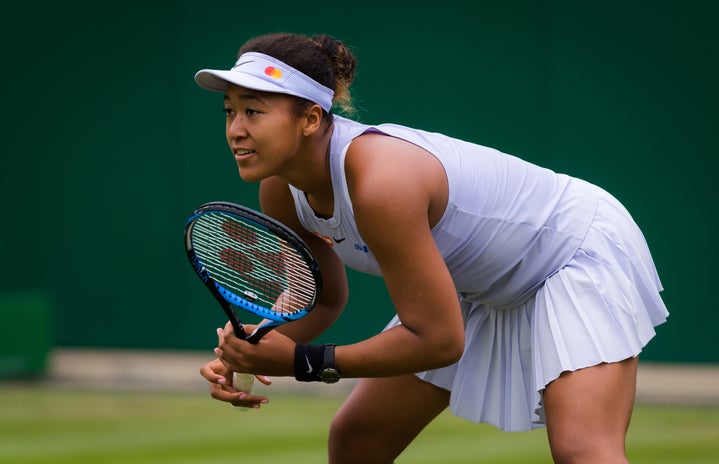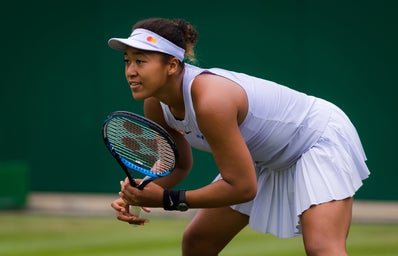A broken bone can be x-rayed, a sprained ankle can be taped, a black eye can be iced but what do all of those injuries have in common? They can all be seen. Anxiety, depression, obsessive-compulsive disorder, eating disorders, addictions, substance abuse and emotional abuse, are not as easily seen as physical injuries.
Because of this, there is a stigma around mental health that often leads to the affected individual’s concerns being overlooked or labeled as “just wanting attention.” This stigma is even worse for elite athletes who are supposed to be portrayed as unstoppable. But professional athletes are not superhumans. Sure, they are super athletic and dedicated humans, but they are still only human.
Naomi Osaka made headlines after she declined to speak at after-match press conferences earlier this year. This led to the discussion of “should athletes truly be forced and fined into these situations, especially after a tough match, or do they have a right to opt-out?”
Following this controversial action, Osaka withdrew from the French Open in May 2021, as well as the Wimbledon tournament, due to her own mental health concerns. During her mental health break, she stayed quiet about her decision and avoided media contact. On July 8th, 2021, she published an essay through Time titled “It’s O.K. Not to Be O.K.”. In her essay, she states, “Perhaps we should give athletes the right to take a mental break from media scrutiny on a rare occasion without being subject to strict sanctions.”
Sha’Carri Richardson was expected to be a force to be reckoned with in the 100-meter race at the 2021 Olympics until she tested positive for marijuana use. Richardson was required to take a one-month suspension, which she accepted. Her reason for using marijuana was due to the unexpected loss of her biological mother. She was overwhelmed with her emotions at the time and needed a coping mechanism.
Grieving the loss of a family member is hard on anyone, and the way people handle their grief is different for everyone. She knew after the test results were released that she would be criticized, but simply said, “I just say, don’t judge me and I am human — I’m you, I just happen to run a little faster.”
Simone Biles is another household name that has made major waves in bringing awareness and recognition to the mental health struggles of professional athletes. She is the most decorated U.S. women’s gymnast ever, having earned 32 World and Olympic Medals. Biles withdrew from most of the competitions during the 2021 Tokyo Olympics due to the “twisties.” The “twisties” phenomenon causes gymnasts to lose their sense of direction mid-air and is especially dangerous. It does not matter how often a gymnast has done a certain trick or how good they are at it. Losing one’s sense of self and spatial awareness is never good.
After taking some time off during the Olympic competition, Biles later returned to the floor, still taking home a silver and a bronze for the U.S. and herself. Because of the global attention she brought to the stigma of mental health, Biles was awarded the 2021 BBC Sports Personality of the Year Lifetime Achievement Award, TIME’s 2021 Athlete of the Year and named one of People Magazine’s 2021 People of the Year.
In an ongoing issue, another women’s tennis player has been in the spotlight lately regarding her well-being and safety. Peng Shuai, a Chinese Tennis player, went missing after sharing sexual assault allegations against a top Chinese Communist Party Official. The International Olympic Committee (IOC) claims to have contacted Shuai but has not provided proof of the matter that she is safe and well. Because of this, the Women’s Tennis Association (WTA) has decided to suspend all tournaments in China.
The WTA CEO and chairman Steve Simon respond by stating, “If powerful people can suppress the voices of women and sweep allegations of sexual assault under the rug, then the basis on which the WTA was founded — equality for women — would suffer an immense setback.” China, unfortunately, has been a country with a reputation for abusing human rights. The 2022 Winter Olympics are scheduled to be held in China’s capital Beijing, but several democratic countries have started a “diplomatic boycott,” beginning with the United States because of recent events.
The stance of these countries and the strong stance taken by the WTA is not only fighting for human rights but also athlete’s rights. Holding China accountable relates to the events of the Larry Nassar trial and the repercussions faced by USA Gymnastics.
Taking care of one’s mental health is important, whether you are an athlete, a politician, a doctor or an average person. This past year, athletes have acknowledged outdated institutions that need redoing, unseen struggles that are overwhelming and endanger a person’s physical well-being. Many organizations have taken a stand to protect their athlete’s best interests, all in the name of mental health.
Athletes have furthered the conversation about the mental health stigma by setting examples and acknowledging abuse. With so much progress made this year, there is no doubt that this upcoming year will include more big names sharing their stories and taking care of themselves first.
The 2022 Beijing Winter Olympics will be a historical event facing all sorts of pressure to ensure that the athletes are listened to, respected and taken care of. It does not matter who you are or what your profession is, is, know that it is O.K. not to be O.K.


